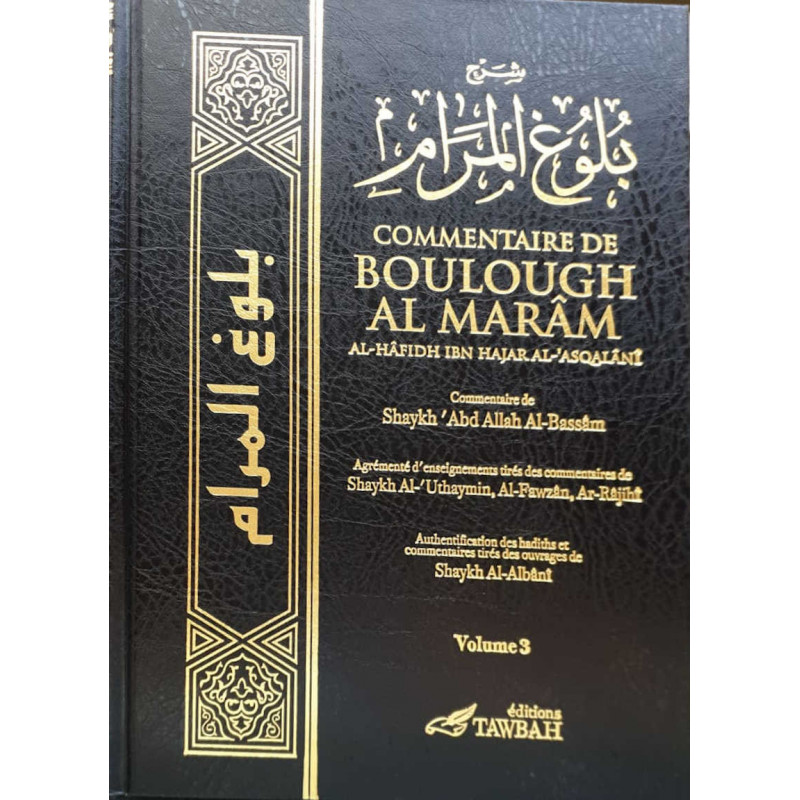- Nouveautés




Promotions SANA: Jusqu’à -20%, Cliquez ici
Promotions SANA: Jusqu’à -20%, Cliquez ici
Boulough Al Maram by Ibn Hajar Al-Asqalani in 3 volumes.
Commentary by Shaykh Abd Allah Al-Bassam.
Embellished with insights from the commentaries of Shaykh Al-Uthaymin, Al-Fawzan, Ar-Rajihi.
Authentication of hadiths and commentaries drawn from the works of Shaykh Al-Albani.
a compilation of authentic hadiths of the prophets which covers all the religious practices of the Muslim.
Bulûgh Al-Marâm is a blessed and beneficial book; although it is not very voluminous, it contains what makes it possible to dispense with longer works, and scholars, past and contemporary, have turned to it.
Thus, one does not find a seat of a scholar without Bulûgh Al-Marâm appearing at the top of the list of courses; and students have adopted it for memorization and scientific discussion, contenting themselves with it at the expense of other similar works. People have accepted it and turned to it so that at all times the greatest number have benefited from it.
This book has outstanding qualities not found elsewhere, including:
In short, Bulûgh Al Marâm is one of the best books in the presentation of religious rules, and it is appropriate for students of religious sciences to memorize it, understand it; and pay close attention to it. The author has written it eloquently, so that he who memorizes stands out among his fellows, so that he who begins on the path of science can help himself, and so that he who is more advanced cannot get away with it. pass; May Allah grant the author the best of rewards.
Biography of Ibn Hajar Al-Asqalani:
Childhood and studies
He was born in Cairo in 1372, son of the scholar and poet Shafi'i Nur al-Din Ali. His two parents having died during his childhood, he became, together with his sister, Sitt al-Rakb, ward of the brother of his father's first wife, Zaki al-Din al-Kharrubi who enrolled Ibn Hajar in a Koranic school then that he was only five years old. He excelled in his studies, learning Surah Maryam in a single day and making progress in memorizing texts like the Quran and then the abridged version of Ibn al-Hajib's works on the foundations of Fiqh. When he accompanied al-Kharrubi to Mecca at the age of 12, he was considered capable of leading the Tarawih prayers during Ramadan. When his tutor died in 1386, Ibn Hajar's education in Egypt was entrusted to a scholar versed in Hadith, Shams al-Din ibn al-Qattan who had him attend classes given by al-Bulqini (d. 1404) and Ibn al-Mulaqqin (d. 1402) in the field of Shafi'i Fiqhs and Zayn al-Din al-'Iraqi (d. 1404) in the field of hadith, until he went to Damascus and Jerusalem study under Shams al-Din al-Qalqashandi (d. 1407), Badr al-Din al-Balisi (d. 1401) and Fatima bint al-Manja Tanukhiyya (d. 1401).
After another visit to Mecca, Medina and Yemen, he then returned to Egypt. In 1397, at the age of twenty-five, he married Anas Khatun who was herself an expert in hadith by the knowledge in ijaza which she had from Zayn al-Din al-'Iraqi. She gave public lectures at assemblies in Ulema attended by al-Sakhawi.
Ibn Hajar was appointed several times to the post of Egyptian judge (Cadi) and is the author of more than fifty works on the hadiths, history books, biographies, Koranic exegeses (Tafsir), compilations on Shafi'i poetry and jurisprudence. In 1414 (817 AH), Ibn Hajar took on the immense task of commenting on the work of Sahih Bukhari. Ibn Rajab began writing a huge commentary on Sahih Bukhari in the 1390s under the title of Fath al-Bari, but had only come to the funeral prayers section by the time of his death.
Ibn Hajar decided to give his own commentaries the same title, Fath al-Bari, which over time became Sahih Bukhari's most famous commentary. When he finished it, in December 1428, a ceremony took place near Cairo, in which the ulemas, judges and the main Egyptian personalities took part. Ibn Hajar read the last pages of his work, after which the poets recited eulogies and gold was distributed. It was according to the historian Ibn Iyaas, the biggest celebration of the time in Egypt.
Death of Ibn Hajar
Ibn Hajar died after Isha prayers on February 2, 1449 at the age of seventy-nine. His funeral in Cairo was attended by a crowd estimated at fifty thousand people, including the sultan and the caliph.
works
References
This article is partly or wholly taken from the English Wikipedia article titled
“Ibn Hajar al-Asqalani”
Ibn Rajab's work was published by Dar Ibn al-Jawzi and consisted of 7 volumes corresponding only to the first 12 of the 77 sections of the complete works of Sahih Bukhari (i.e. less than a 1/6 of the entire book). One can only imagine the magnitude that this work would have had if Ibn Rajab had been able to bring it to completion.
Some themes of volume 1:
The Book of Purification
The Book of Prayer
Data sheet
Specific References
Une mer de savoir dans le fiqh
Un excellent livre macha Allah. Je n'arrête pas de feuilleter ses pages à chaque fois que j'entreprends quelque chose dans ma vie. Je ne pose pas un pied sans lire Boulough al Maram. L'auteur du livre est le juge des juges d'Egypte. Je salue également le traducteur et le commentateur le Shaykh Abd Allah Al-Bassam.